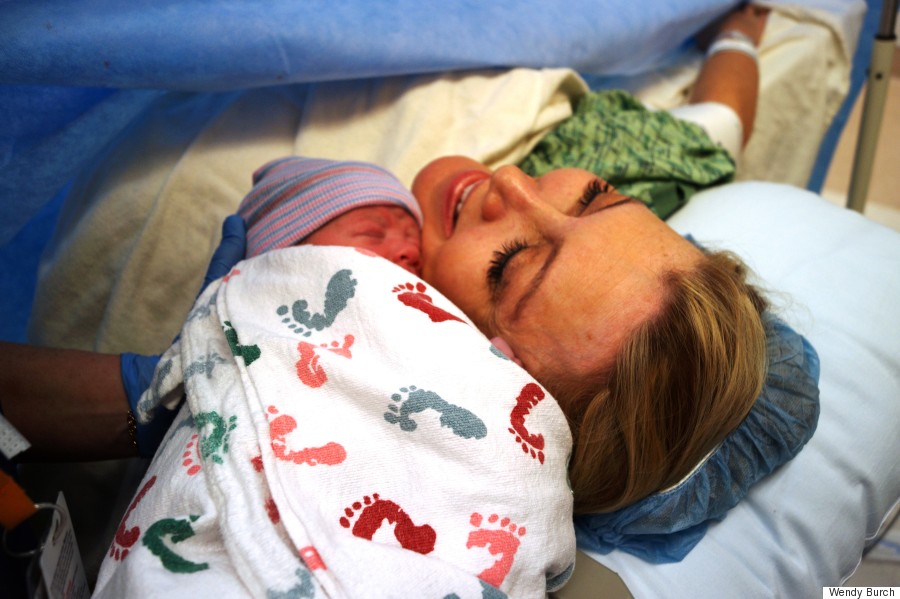
Before
the sun even rises in Los Angeles, television news reporter Wendy Burch
is often rushing down a freeway in her car, headed to report live at a
developing scene. She is accustomed to working on the fly and pushing
past yellow tape. She often ad-libs her report if there’s not enough
time to write a script.
But these days, if she’s waiting around before going on the air, instead of talking to her peers about the crime investigation at hand, she says she talks to them about egg freezing.
Burch is 46-years-old and spent five years trying to conceive -- first the old fashioned way starting when she was 41, and then with the help of traditional in vitro fertilization (IVF). But she was unsuccessful.
“When you go through the world of fertility, you start off with a preconceived idea. You think you will maybe do one or two IVF rounds and before you know it, you will be pushing the baby in the stroller,” she told The Huffington Post in an interview in L.A.
“And then it doesn’t work. I don’t think any woman walks into a fertility clinic and says, ‘You know, I think I’ll have a donor egg and a surrogate.’ It’s a process of elimination.”
Despite discussing her long, frustrating process, Burch is outrageously funny. She jokes about hair extensions and breast augmentation and Botox. She is tall and has a deep laugh. The cadence of her voice gives away her 20-plus years on the air -- she speaks for a living.
When she arrives at The Huffington Post offices she is dressed in chic, black pants and black and gold high heels, but carries something much more expensive with her: her five-month old son, Brady.
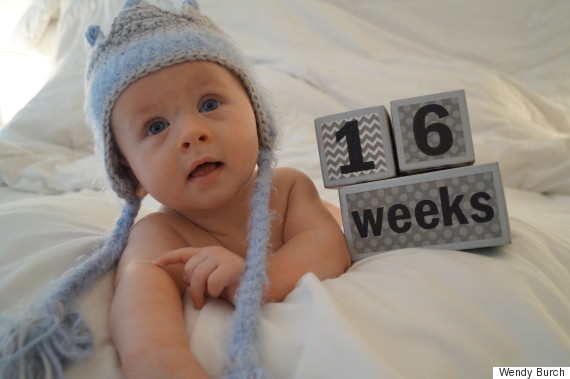
Wendy Burch's son, Brady, at 16 weeks old.
Adopted
as an infant and raised Mormon in Salt Lake City, Burch was a pageant
girl. She was crowned Miss Salt Lake City in 1989 when she was
20-years-old but did not go on to win Miss Utah.
“I lost out to the bitch that played the classical harp. How do you beat the classical harp? You don’t,” she said.
Her true talent was always storytelling. Long before she visited a local television station with her high school class, Burch was at the dinner table giving her family a full daily report on the neighborhood. “I was probably the only 12-year-old who used the word ‘allegedly,’” she said.
Touring the local TV station as a teen only strengthened her passion. She remembers walking away knowing that it was what she wanted to do for a living.
Fast forward 24 years and Burch has had jobs reporting the news in Salt Lake City, Eureka, Reno, Cincinnati, Dallas, Denver, Phoenix, New York and Los Angeles. She was 22-years-old in her first job when the news director of the station quit, making her one of the youngest news directors in the country.
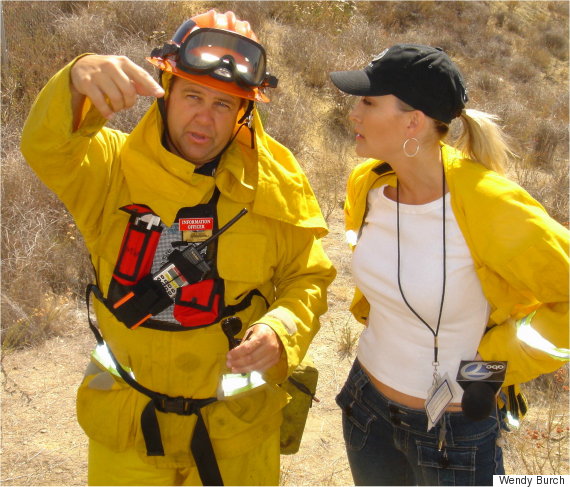
Burch reporting on the California wildfires for KABC in Los Angeles, 2002.
Having
children was always part of the plan. “It was just a matter of meeting
the right guy and having the right job and the perfect life,” she
laughed. “But there was never a moment that I thought, 'I’ll be one of
those ladies that has nice shoes and no children.'”
When her doctor talked to her about freezing her eggs at 36, Burch considered it but ultimately decided against it. It was much more expensive at the time and the success rate for pregnancy with frozen eggs a decade ago was only about 20-25 percent, she said.
She kept working and kept dating. She met Brady’s father soon after she turned 40. He was tall, handsome and even though he was already a father, he was open to having more children.
When she was 41, they began trying to get pregnant -- but to no avail. Burch eventually started traditional IVF treatment, which is a procedure that uses the woman’s own eggs and either the sperm of her partner or the sperm of a donor to conceive. She was determined to make it work. But after a few years, money stretched thin.
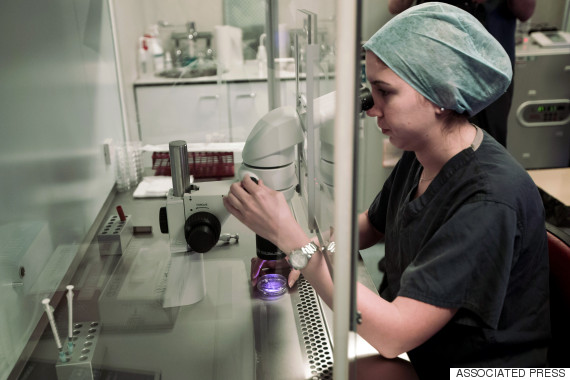
An embryologist works on embryo at the Create Health fertility clinic in south London.
IVF
fertilization can cost $12,000 or more per round. That’s before the
necessary medications, which can be an additional $3,000 or $4,000.
“I had very little left. I quit counting how much money I’d spent after $50,000,” Burch said. At this point she was 45.
According to Burch, the odds of a successful pregnancy using her own 45-year-old eggs were 2-3 percent. The odds of having a child with Down Syndrome was 1 in 30, and the odds of a miscarriage were 40-60 percent.
Adoption is something she thought about, but couldn't commit to.
Burch was adopted when she was only five days old. As an adult, she attempted to find her biological mother but with no success. Having a baby with her genes was something she had always craved. “I wanted to feel that connection and I wanted it to be a part of me,” she said. “I wanted the baby bump, the ultrasound and the first kick. I wanted the terror of labor and delivery. I wanted the whole thing.”
One of the biggest problems Burch sees in the way that our society deals with fertility today is the silence.
“I would look at a cover of a magazine with celebrity X, Y or Z at age 40-something and the headline would say: ‘Miracle babies!’ I would think if it can happen to them, it can happen to me,” Burch said.
“Never in those articles did they mention IVF, frozen eggs or a donor egg. The odds are it wasn’t just a miracle conception but that she sought out fertility specialists. There shouldn’t be shame in that.”
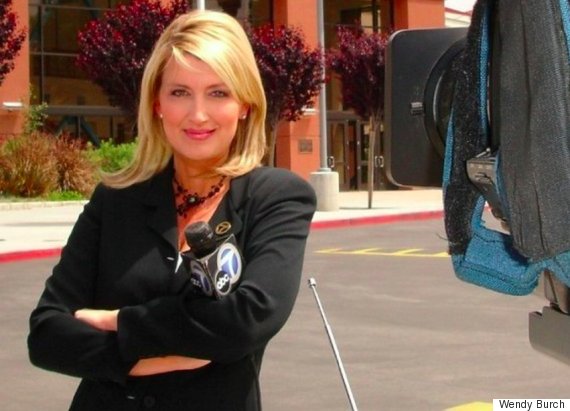
The donor egg
entered the picture as a last resort. If she couldn’t have a baby with
her own eggs, Burch was warming up to the idea that she could still
carry and give birth to a baby with the help of a donor.
There are two main ways to go about getting a donor egg. Egg donation agencies actively recruit young women who are willing to donate their eggs -- this is common on college campuses and there is a strong screening process in place.
Once the young woman decides that she wants to proceed, she goes through an in vitro cycle and has her eggs removed. They are either kept fresh or frozen. The person buying the eggs (usually in lots of six) covers all of the costs of the drugs and procedure. The donor is paid anywhere from $8,000 and $12,000.
If a woman buys the eggs fresh, the whole process can cost up to $30,000. Burch simply did not have that money. Buying a set of six eggs that have been frozen, however, was significantly cheaper. It would cost $10,000.
At this point, Burch’s relationship was strained. She felt her fiancé was running out of patience after nearly five years of trying to conceive. “He had been through the weight gain and the shots and the hormones that made my head spin around. Anyone who has tried to get pregnant aggressively knows it is a huge strain on any couple,” she said.
She scraped together the last $10,000 and promised her partner that this would be the last time they tried. She thought of it as her Hail Mary.
Choosing an egg is a lot like online dating, she joked. “You go online and look at profiles but in this case, someone is definitely getting knocked up.”
She looked through the profiles, sorting by height and ethnicity so that the baby would hopefully look like her -- but said she was looking for a more powerful sign.
She found a 22-year-old donor who was 5 feet 11 inches tall. When she read that the donor was studying to be a broadcast journalist, just like Burch, she felt that it was her sign. She compared the donor’s provided baby photo to her own and saw a sweet resemblance. Burch remembers feeling an “overwhelming sense of peace” and did not look at another profile.
She placed her order for six frozen eggs over the phone with a receptionist in Atlanta, Georgia, and they shipped out right away. But when they arrived, instead of finding six in the lot, there was one extra egg with no explanation. This would turn out to be lucky number seven.
The doctor fertilized all seven eggs with the male sperm and then monitored them over the next five days. Typically not all of the eggs will successfully fertilize. In Burch’s case, six died off. And only one remained.
Today that one Hail Mary sits cooing in her arms and occasionally puts his whole mouth around her chin -- she is his favorite teething toy.
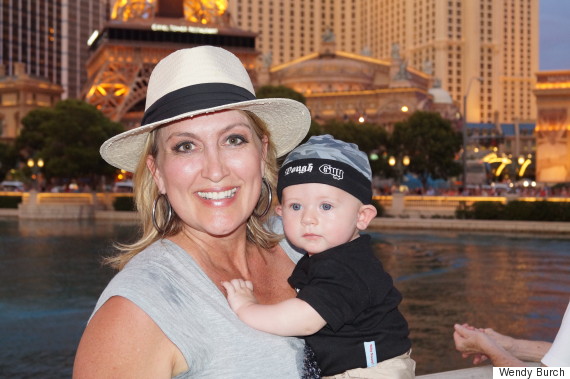
Wendy and Brady on a family trip to Las Vegas in June 2015.
"I
look at him and no one can tell me he’s not mine. I carried him. I gave
him life,” Burch said. “Yeah it’s not my genes, but it doesn’t matter.
He was inside of me. Maybe his chin is going to be hers, but those are
the things that are going to make him unique and will make me remember
this person who I never knew who gave me the greatest gift I’ll ever have.”
Burch and her fiancé split shortly after she became pregnant and she is raising Brady on her own.
"Is it perfect? No. I’m a 46-year-old single mother who gets up at 3 a.m. and is on the air at 5 a.m. But I’m home with Brady before noon. People always talk about motherhood turning their lives upside down. I look back now and I think my life was upside down. Brady and motherhood turned it right side up. Everything is where it’s supposed to be," she said.
The decision to have children is something every woman has to consider on her own. For Burch, the answer was easy -- but the journey certainly was not. Her biggest mission today is helping to educate young women about the benefits of freezing their eggs when they are young.
The cost of freezing eggs can vary greatly from doctor to doctor and amongst fertility centers. The Southern California Reproductive Center, where Burch was a patient for five years, says the general ballpark for freezing eggs runs just under $10,000 and that the medication required for treatment can cost an additional $3,000-$5,000.
Companies like Apple and Facebook made headlines in 2014 when they announced that the cost of egg freezing would be a covered benefit. While many celebrated the decision and what it means for women in the workplace, many critics summarized the decision as just a way to keep women working tirelessly through their childbearing years.
Others wrote about the risks associated with the procedure and the factors that people aren't talking about.
Two years ago, the American Society for Reproductive Medicine (ASRM), an organization representing hundreds of fertility clinics in the U.S., lifted the “experimental” label from the procedure, but stated that “there was still not enough known about the egg freezing procedure’s safety, efficacy, cost-effectiveness, and emotional risks.” They suggested that widespread use may "give women false hope and encourage women to delay childbearing."
Despite the conflicting reports, Burch still wishes she had frozen her eggs -- even at age 36, even when it was more expensive and often less successful than it is today.
“The hope is that one day, when ambitious career-driven women graduate from college, the gift from their families isn’t going to be a nice watch or a car. It’s going to be a gift certificate to go freeze their eggs,” she said.
“As women, we are afforded so many more opportunities now. We should take advantage of each one. But the thing that hasn’t changed is our internal mechanical engine. Your body hasn’t changed to keep up with the opportunities out there. This can give everyone a little bit more time.”
But these days, if she’s waiting around before going on the air, instead of talking to her peers about the crime investigation at hand, she says she talks to them about egg freezing.
Burch is 46-years-old and spent five years trying to conceive -- first the old fashioned way starting when she was 41, and then with the help of traditional in vitro fertilization (IVF). But she was unsuccessful.
“When you go through the world of fertility, you start off with a preconceived idea. You think you will maybe do one or two IVF rounds and before you know it, you will be pushing the baby in the stroller,” she told The Huffington Post in an interview in L.A.
“And then it doesn’t work. I don’t think any woman walks into a fertility clinic and says, ‘You know, I think I’ll have a donor egg and a surrogate.’ It’s a process of elimination.”
Despite discussing her long, frustrating process, Burch is outrageously funny. She jokes about hair extensions and breast augmentation and Botox. She is tall and has a deep laugh. The cadence of her voice gives away her 20-plus years on the air -- she speaks for a living.
When she arrives at The Huffington Post offices she is dressed in chic, black pants and black and gold high heels, but carries something much more expensive with her: her five-month old son, Brady.

Wendy Burch's son, Brady, at 16 weeks old.
“I lost out to the bitch that played the classical harp. How do you beat the classical harp? You don’t,” she said.
Her true talent was always storytelling. Long before she visited a local television station with her high school class, Burch was at the dinner table giving her family a full daily report on the neighborhood. “I was probably the only 12-year-old who used the word ‘allegedly,’” she said.
Touring the local TV station as a teen only strengthened her passion. She remembers walking away knowing that it was what she wanted to do for a living.
Fast forward 24 years and Burch has had jobs reporting the news in Salt Lake City, Eureka, Reno, Cincinnati, Dallas, Denver, Phoenix, New York and Los Angeles. She was 22-years-old in her first job when the news director of the station quit, making her one of the youngest news directors in the country.

Burch reporting on the California wildfires for KABC in Los Angeles, 2002.
When her doctor talked to her about freezing her eggs at 36, Burch considered it but ultimately decided against it. It was much more expensive at the time and the success rate for pregnancy with frozen eggs a decade ago was only about 20-25 percent, she said.
She kept working and kept dating. She met Brady’s father soon after she turned 40. He was tall, handsome and even though he was already a father, he was open to having more children.
When she was 41, they began trying to get pregnant -- but to no avail. Burch eventually started traditional IVF treatment, which is a procedure that uses the woman’s own eggs and either the sperm of her partner or the sperm of a donor to conceive. She was determined to make it work. But after a few years, money stretched thin.

An embryologist works on embryo at the Create Health fertility clinic in south London.
“I had very little left. I quit counting how much money I’d spent after $50,000,” Burch said. At this point she was 45.
According to Burch, the odds of a successful pregnancy using her own 45-year-old eggs were 2-3 percent. The odds of having a child with Down Syndrome was 1 in 30, and the odds of a miscarriage were 40-60 percent.
Adoption is something she thought about, but couldn't commit to.
Burch was adopted when she was only five days old. As an adult, she attempted to find her biological mother but with no success. Having a baby with her genes was something she had always craved. “I wanted to feel that connection and I wanted it to be a part of me,” she said. “I wanted the baby bump, the ultrasound and the first kick. I wanted the terror of labor and delivery. I wanted the whole thing.”
One of the biggest problems Burch sees in the way that our society deals with fertility today is the silence.
“I would look at a cover of a magazine with celebrity X, Y or Z at age 40-something and the headline would say: ‘Miracle babies!’ I would think if it can happen to them, it can happen to me,” Burch said.
“Never in those articles did they mention IVF, frozen eggs or a donor egg. The odds are it wasn’t just a miracle conception but that she sought out fertility specialists. There shouldn’t be shame in that.”

There are two main ways to go about getting a donor egg. Egg donation agencies actively recruit young women who are willing to donate their eggs -- this is common on college campuses and there is a strong screening process in place.
Once the young woman decides that she wants to proceed, she goes through an in vitro cycle and has her eggs removed. They are either kept fresh or frozen. The person buying the eggs (usually in lots of six) covers all of the costs of the drugs and procedure. The donor is paid anywhere from $8,000 and $12,000.
If a woman buys the eggs fresh, the whole process can cost up to $30,000. Burch simply did not have that money. Buying a set of six eggs that have been frozen, however, was significantly cheaper. It would cost $10,000.
At this point, Burch’s relationship was strained. She felt her fiancé was running out of patience after nearly five years of trying to conceive. “He had been through the weight gain and the shots and the hormones that made my head spin around. Anyone who has tried to get pregnant aggressively knows it is a huge strain on any couple,” she said.
She scraped together the last $10,000 and promised her partner that this would be the last time they tried. She thought of it as her Hail Mary.
Choosing an egg is a lot like online dating, she joked. “You go online and look at profiles but in this case, someone is definitely getting knocked up.”
She looked through the profiles, sorting by height and ethnicity so that the baby would hopefully look like her -- but said she was looking for a more powerful sign.
She found a 22-year-old donor who was 5 feet 11 inches tall. When she read that the donor was studying to be a broadcast journalist, just like Burch, she felt that it was her sign. She compared the donor’s provided baby photo to her own and saw a sweet resemblance. Burch remembers feeling an “overwhelming sense of peace” and did not look at another profile.
She placed her order for six frozen eggs over the phone with a receptionist in Atlanta, Georgia, and they shipped out right away. But when they arrived, instead of finding six in the lot, there was one extra egg with no explanation. This would turn out to be lucky number seven.
The doctor fertilized all seven eggs with the male sperm and then monitored them over the next five days. Typically not all of the eggs will successfully fertilize. In Burch’s case, six died off. And only one remained.
Today that one Hail Mary sits cooing in her arms and occasionally puts his whole mouth around her chin -- she is his favorite teething toy.

Wendy and Brady on a family trip to Las Vegas in June 2015.
Burch and her fiancé split shortly after she became pregnant and she is raising Brady on her own.
"Is it perfect? No. I’m a 46-year-old single mother who gets up at 3 a.m. and is on the air at 5 a.m. But I’m home with Brady before noon. People always talk about motherhood turning their lives upside down. I look back now and I think my life was upside down. Brady and motherhood turned it right side up. Everything is where it’s supposed to be," she said.
The decision to have children is something every woman has to consider on her own. For Burch, the answer was easy -- but the journey certainly was not. Her biggest mission today is helping to educate young women about the benefits of freezing their eggs when they are young.
The cost of freezing eggs can vary greatly from doctor to doctor and amongst fertility centers. The Southern California Reproductive Center, where Burch was a patient for five years, says the general ballpark for freezing eggs runs just under $10,000 and that the medication required for treatment can cost an additional $3,000-$5,000.
Companies like Apple and Facebook made headlines in 2014 when they announced that the cost of egg freezing would be a covered benefit. While many celebrated the decision and what it means for women in the workplace, many critics summarized the decision as just a way to keep women working tirelessly through their childbearing years.
Others wrote about the risks associated with the procedure and the factors that people aren't talking about.
Two years ago, the American Society for Reproductive Medicine (ASRM), an organization representing hundreds of fertility clinics in the U.S., lifted the “experimental” label from the procedure, but stated that “there was still not enough known about the egg freezing procedure’s safety, efficacy, cost-effectiveness, and emotional risks.” They suggested that widespread use may "give women false hope and encourage women to delay childbearing."
Despite the conflicting reports, Burch still wishes she had frozen her eggs -- even at age 36, even when it was more expensive and often less successful than it is today.
“The hope is that one day, when ambitious career-driven women graduate from college, the gift from their families isn’t going to be a nice watch or a car. It’s going to be a gift certificate to go freeze their eggs,” she said.
“As women, we are afforded so many more opportunities now. We should take advantage of each one. But the thing that hasn’t changed is our internal mechanical engine. Your body hasn’t changed to keep up with the opportunities out there. This can give everyone a little bit more time.”
No comments:
Post a Comment